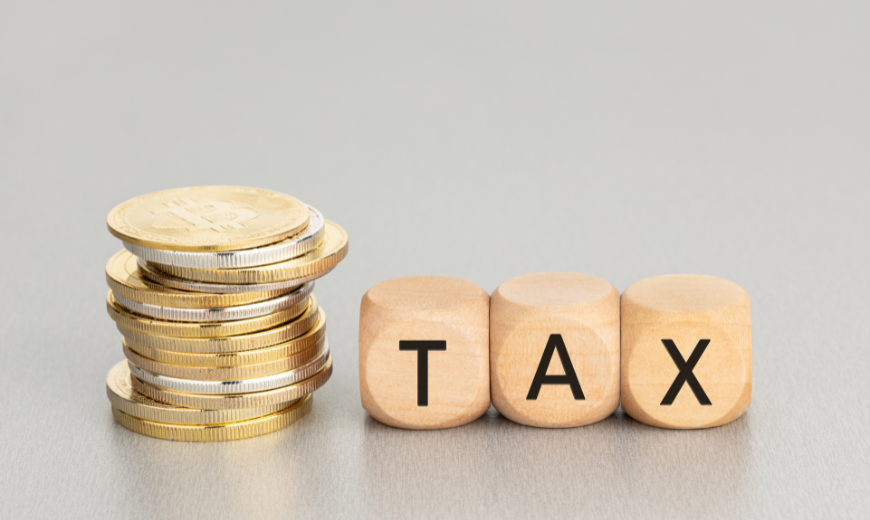
You buy a cup of coffee not with cash or a credit card but with a few digital coins stored on your phone. This isn’t part of a fantasy novel. It is a digital coin called Bitcoin, the first-ever cryptocurrency. It’s built using an innovative technology known as blockchain. Bitcoin has gained popularity after many chose it as an investment choice. Yet, its growth brings a fresh twist—bitcoin taxes.
So, you’re delving into the thrilling universe of blockchain education, right? You’re mulling over its business uses and wondering – how is Bitcoin taxed? Perhaps you’ve used a Bitcoin tax calculator and realized – WOW, the tax rules around Bitcoin can be tricky to untangle! You need to chill out, brave one! Because this blog post is your map. We’ll crack the code on how various nations handle Bitcoin profits and steer you through the taxing terrain of this digital domain.
The Challenges of Taxing Cryptocurrencies
Bitcoin and other digital currencies’ surge is testing governments around the globe in a new way: “Taxes.” These online riches blur the old and the new in finance, making tracking and reporting transactions tough. Let’s take a look at the main difficulties.
Behind the Scenes Action: Unlike old-school businesses like shares or bonds, Bitcoin deals can unfold behind the scenes. This makes it challenging for the tax guys to keep track of who has what and the gains made on it.
Trading Bitcoin Internationally: Bitcoin’s global reach makes transferring money easy, but it can also lead to tax confusion, especially for those trading often across borders.
Differing Bitcoin Value: The rise and fall of Bitcoin prices create a tax calculation challenge. With Bitcoin value changing frequently, it’s hard to pinpoint the exact profit or loss for taxes.
Note: These difficulties suggest we need creative solutions and worldwide cooperation for effective Bitcoin taxation. While learning more about blockchain can clarify cryptocurrency technology, we need clear rules and reporting requirements for fair and efficient Bitcoin taxes.
Classifying Bitcoin Profits
How Bitcoin profits are taxed varies greatly based on how each country classifies it. This classification sets the tax rate and what needs to be reported. Let’s explore the three main classifications used worldwide:
1. Property: The United States and several other nations see Bitcoin the same way they see things like gold or houses. If a Bitcoin owner sells theirs and makes money, they must pay a capital gains tax. This tax comes from the difference between what they sold it for and what they bought it for.
2. Income: Places like Vietnam see Bitcoin as earnings. This means income tax rates come into play with Bitcoin profits, which can be higher than capital gains taxes. This viewpoint can add extra taxes for Bitcoin investors.
3. Trade System: Some places consider Bitcoin transactions for swapping goods or services. This mindset changes the way taxes work compared to asset or earnings viewpoints, though it’s not as common and can make things more complex for investors.
The Impact of Inconsistency
A global lack of agreement in Bitcoin classifications can muddy the waters for investors and companies working in multiple countries. Such inconsistency could lead to issues such as:
- Dual Taxes: The same Bitcoin profits can be taxed in two countries due to mismatched classifications.
- Regulatory Doubts: Hazy tax guidelines may hinder investment and originality in the blockchain business sector.
Blockchain Awareness and Teamwork
Blockchain education is vital in helping individuals and businesses grasp the science of cryptocurrencies and navigate the changing tax environment. Moreover, cross-border cooperation among tax officials is vital for creating standardized rules and classification methods for Bitcoin and other digital assets. This will result in clear guidelines, better prediction, and, eventually, a more streamlined system to tax the digital realm.
Bitcoin Taxation in Different Countries
Knowing how countries view, and tax Bitcoin profits is key to handling the tricky world of cryptocurrency investments. Let’s take a worldwide trip to understand how Bitcoin is taxed and see the different methods places use.
United States: Seeing Bitcoin as property, the US has led in taxing cryptocurrency. So, if you profit by selling Bitcoin, you must pay tax on the gain from the sell and buy price. Also, if your Bitcoin transactions exceed $10,000, the US says you must tell the Internal Revenue Service (IRS).
The European Union: The European Union is a complex structure, with each country following its rules.
- Germany: Bitcoin is a private asset in Germany. If you hold it for over a year, you must pay a capital gains tax.
- France: France thinks of Bitcoin as a movable asset, like personal possessions, and you get taxed on income.
Asia: Here, things work differently
- China: This country used to be a hub for Bitcoin mining, but it’s clamped down hard, so their tax rules don’t matter now.
- Japan: This country thinks Bitcoin’s great. They treat it like money, and under specific rules, like if you buy stuff with it, there’s no capital gains tax.
- Singapore: This country is working on solid rules for cryptocurrencies, devising a specific tax schedule for digital assets.
Different places and rules: Bitcoin’s treatment varies From South America to Africa.
- South America: In spots like Argentina, Bitcoin is viewed as an item or service, yielding unique tax impacts.
- Africa’s case? Countries like South Africa haven’t yet implemented specific Bitcoin tax rules.
Navigating The Maze
Grasping the nuts and bolts of blockchain and crypto investment approaches can come through Bitcoin education. Yet, one has to stay updated on the ever-changing tax world around them. A tax expert’s advice could be gold here, helping you steer through Bitcoin tax intricacies and stick to the rules.
Remember: Bitcoin tax calculators give a rough clue of your tax dues but shouldn’t be your only resource. Knowing your country’s Bitcoin tax law and seeking expert advice as required could save you from heavy losses down the line.
The Future of Bitcoin Taxation
Bitcoin and similar cryptocurrencies face ever-changing tax rules worldwide. As the trend of global teamwork to create consistent rules increases, groups like the Organization for Economic Cooperation and Development (OECD) are creating tax plans for crypto assets. This work may bring good results:
Uniform Category—Agreeing globally on defining Bitcoin could give businesses and investors in the blockchain field the predictability they need. A standardized definition would remove misunderstandings caused by differing current views, leading to a clearer, fairer, more effective tax process.
Better Tax Gathering: Having uniform report rules could help tax officials more easily and successfully conduct tax transactions with cryptocurrency. This means every person involved in the digital economy will give what they should.
Enhance Transparency: Straightforward and steady rules would make the cryptocurrency market more honest and open. This builds trust and might bring in more money invested. Both people who invest and businesses in the blockchain world could see perks from this.
What Does the Road Ahead Hold?
Bitcoin taxation’s future has a good chance of being more straightforward and effective. But to move around this setup, you need to know about blockchain and be ready to act. It’s crucial to grasp how your homeland judges and taxes Bitcoin. Finding a tax pro for advice might really pay off, especially if your investment game is sophisticated. As the rules keep shaping up, staying on top of things and being open to change will help you make your way successfully through the thrilling universe of Bitcoin and other digital currencies.
Conclusion
Navigating Bitcoin taxes can be tricky. How? Laws vary. Each country has its own rules. This blog breaks it all down. We’ve examined the tough parts, how Bitcoin is classified, and how laws differ worldwide. Knowing these differences lets investors and businesses know how to move forward. As laws match up more, we can see a future with clearer, simpler crypto taxes.
Remember, learning about blockchain helps us stay informed and make savvy investment choices.
Essential FAQs
Q: How do you report Bitcoin gains on my tax return?
A: Check your nation’s tax site for rules on crypto transactions. Most insist you report all Bitcoin dealings over a certain limit (e.g., $10,000 in the US)
Q: What if I got Bitcoin before any rules existed?
A: It’s best to ask a tax professional for insights on how old transactions might work with today’s laws. Tax rules can be tricky, so pros can guide you and help you avoid fines.
Q: Can I use a Bitcoin tax calculator to file my taxes?
A: Sure, the Bitcoin tax calculator gives a ballpark figure of your tax dues if your history’s simple. However, they might not cover unique or complex tax situations. It’s smart to ask a tax expert when you file taxes, mainly if you hold lots of Bitcoin or have complex investment plans.
Q: Are there any resources for learning more about blockchain and how it impacts Bitcoin tax?
A: Loads of e-learning platforms have full-fledged articles and blogs on blockchain tech and what it means for investors.






